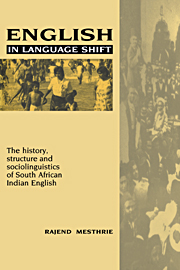 English in Language Shift
English in Language Shift Book contents
- Frontmatter
- Contents
- List of figures and maps
- List of tables
- Preface
- Acknowledgements
- List of abbreviations
- 1 Historical background: the shaping of a New English
- 2 Variation in SAIE: a first glimpse
- 3 Syntactic variation: the relative clause
- 4 Word-order principles
- 5 Non-syntactic variation
- 6 Perspectives from second-language acquisition
- 7 Perspectives from pidgin and creole studies
- Appendix A Comparison between SAIE sample and census data for Indians in Natal
- Appendix B Types of relative clauses used by individual speakers
- Appendix C Rank orders for relative clauses, topics and morphology
- Notes
- Sources and references
- Index
5 - Non-syntactic variation
Published online by Cambridge University Press: 03 December 2009
- Frontmatter
- Contents
- List of figures and maps
- List of tables
- Preface
- Acknowledgements
- List of abbreviations
- 1 Historical background: the shaping of a New English
- 2 Variation in SAIE: a first glimpse
- 3 Syntactic variation: the relative clause
- 4 Word-order principles
- 5 Non-syntactic variation
- 6 Perspectives from second-language acquisition
- 7 Perspectives from pidgin and creole studies
- Appendix A Comparison between SAIE sample and census data for Indians in Natal
- Appendix B Types of relative clauses used by individual speakers
- Appendix C Rank orders for relative clauses, topics and morphology
- Notes
- Sources and references
- Index
Summary
Introduction
Having examined syntactic and syntactic–pragmatic variation in some detail, it is time to turn briefly to other areas of SAIE structure that exhibit significant social patterning: morphology, phonetics and lexis. This chapter will also offer a brief comparison between SAIE and other varieties of English in South Africa.
Morphology
Bughwan (1970) and Crossley (1988) describe some of the salient nonstandard morphological features of SAIE. Bughwan provides a catalogue of ‘errors’ found in the writing of a sample of high-school students in Durban, but does not assess their extent intra- or inter-individually. Crossley attempts to determine the features of SAIE verb-phrase morphology by systematic comparison between SAIE-speaking university students and a control group of White English-speaking students, under test conditions. The test involved an adaptation of one devised by Greenbaum and Quirk (1970) that made deductions about non-standard usage from students' responses to sentences which they were asked to change in certain ways. For example, students were asked to change they to he in the sentence They criticise everything I do.
The hypothesis was that students would be less tempted to go beyond the instructions and make additional changes, to render the new sentence fully standard, (criticise to criticizes) if they had the non-standard form in their dialect. In this particular instance eight out of 122 students from the SAIE group did not make the additional change, while all members of the control group did. On the basis of a close statistical examination of the test results Crossley posits fourteen features of SAIE verb-phrase morphology, some of which are given below:
(a) zero endings on verbs which take [∂z] in standard English: for example, The boy watch the game.
[…]
- Type
- Chapter
- Information
- English in Language ShiftThe History, Structure and Sociolinguistics of South African Indian English, pp. 128 - 151Publisher: Cambridge University PressPrint publication year: 1993


